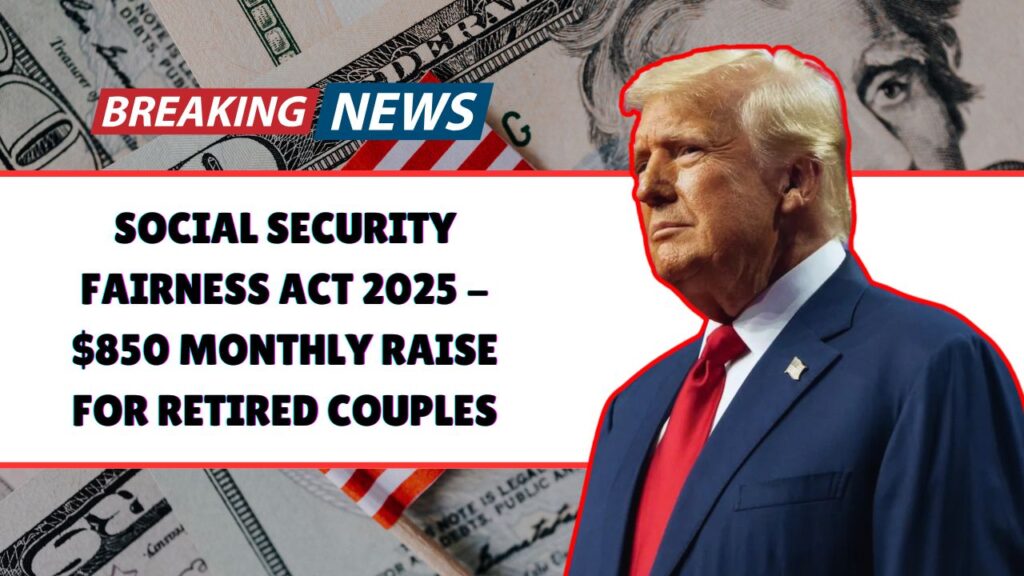The Social Security Fairness Act of 2025 has officially taken effect, bringing long-awaited relief to millions of retired public-service workers and surviving spouses across the United States.
This law corrects old unfair rules and ensures that retirees finally receive the full benefits they earned after years of service.
For decades, two rules — the Windfall Elimination Provision (WEP) and the Government Pension Offset (GPO) — reduced Social Security payments for people who worked in jobs not covered by Social Security.
These workers included teachers, firefighters, police officers, and government employees. With the new Fairness Act, both WEP and GPO are repealed, meaning many retirees will now get higher monthly payments.
What the Fairness Act Changes
The Windfall Elimination Provision (WEP) used to reduce Social Security benefits for people who worked part of their career in jobs that did not pay Social Security taxes.
The Government Pension Offset (GPO) reduced or removed spousal and survivor benefits for people with non-covered pensions.
By removing both of these offsets, the Fairness Act restores fair benefits for those who served their communities in public-sector jobs. Many of these individuals had paid into Social Security during other parts of their careers but were still unfairly penalised.
Who Benefits from the Fairness Act
This law mainly helps:
• Retired public-sector workers like teachers, police officers, firefighters, and government employees.
• Surviving spouses and widows who had lost benefits under GPO.
• Workers who had both public- and private-sector jobs during their careers.
If your entire career was covered under Social Security, you may not see any changes. But those who were affected by the WEP or GPO rules are likely to receive higher benefits starting in 2025.
How Much the Benefits Increase
Many retirees will notice their checks going up by several hundred dollars per month. Some will also receive retroactive payments dating back to early 2024. The amount of the increase depends on your past work and pension type.
Simple Example Table:
| Category of Beneficiary | Previous Monthly Payment | New Monthly Payment | Increase |
|---|---|---|---|
| Retired public-sector workers (WEP affected) | $800 | $1,400 | +$600 |
| Surviving spouses/widows (GPO affected) | $0 | $850 | +$850 |
| Mixed public/private career workers | $950 | $1,500 | +$550 |
These examples show that the average boost ranges from $500 to $850 per month. Actual amounts may differ depending on individual cases.
Why This Reform Matters
The early rollout of payments is important because it helps retirees immediately. Many public-sector workers struggled for years with reduced benefits despite paying into the system. Now, they will have more money for essentials like rent, groceries, and health care.
This reform also restores faith in the Social Security system by proving that fairness and equality are possible. It recognises the years of service that teachers, police officers, and other public servants gave to their communities.
What Beneficiaries Should Do
Most people do not need to apply for this benefit increase. The Social Security Administration is automatically recalculating payments and sending out corrected amounts.
However, it is smart to log in to your My Social Security account and make sure your bank details and contact information are correct.
Those with complex cases may see their new payments a little later, but all eligible retirees will receive their increased benefits once verification is complete.
The Social Security Fairness Act of 2025 is a landmark reform that ends years of unfair treatment for public-sector retirees and surviving spouses. By repealing the WEP and GPO, the government has restored full benefits to millions of Americans.
For many, that means hundreds of dollars more each month, greater financial stability, and long-overdue peace of mind in retirement. This change proves that fairness is possible and that the system can truly work for everyone.
FAQs
Anyone whose Social Security payments were reduced by WEP or GPO and who has a pension from non-covered public employment is likely eligible.
No. The Social Security Administration is updating payments automatically. Just check your account to make sure your information is correct.
Yes, higher benefits could change your taxable income slightly. It is best to check with a tax or financial advisor.
